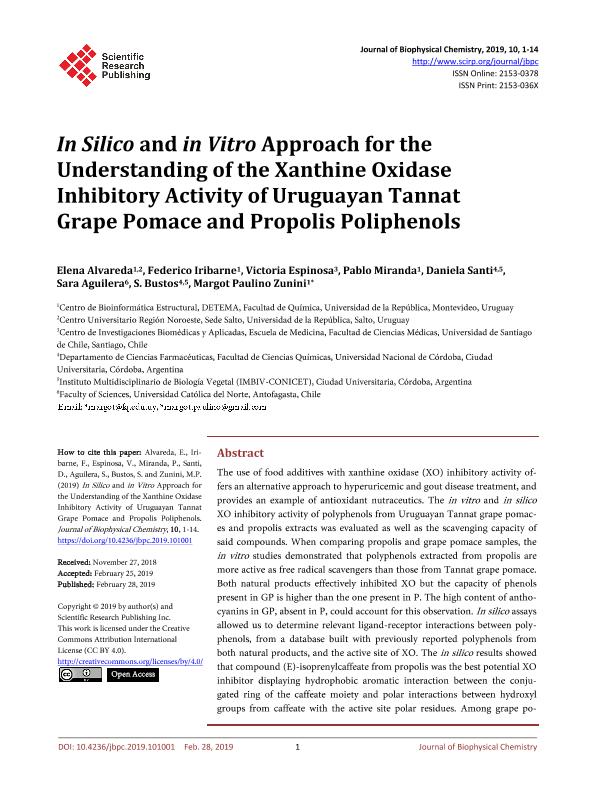Mostrar el registro sencillo del ítem
dc.contributor.author
Alvareda, Elena
dc.contributor.author
Iribarne, Federico
dc.contributor.author
Espinosa, Victoria
dc.contributor.author
Miranda, Pablo
dc.contributor.author
Santi, María Daniela

dc.contributor.author
Aguilera, Sara
dc.contributor.author
Bustos, Pamela Soledad

dc.contributor.author
Paulino Zunini, Margot
dc.date.available
2020-07-17T16:20:23Z
dc.date.issued
2019-02
dc.identifier.citation
Alvareda, Elena; Iribarne, Federico; Espinosa, Victoria; Miranda, Pablo; Santi, María Daniela; et al.; In Silico and in vitro approach for the understanding of the Xanthine Oxidase Inhibitory Activity of Uruguayan Tannat Grape Pomace and Propolis Poliphenols; Scientific Research Publishing; Journal of Biophysical Chemistry; 10; 01; 2-2019; 1-14
dc.identifier.issn
2153-0378
dc.identifier.uri
http://hdl.handle.net/11336/109558
dc.description.abstract
The use of food additives with xanthine oxidase (XO) inhibitory activity offersan alternative approach to hyperuricemic and gout disease treatment, andprovides an example of antioxidant nutraceutics. The in vitro and in silicoXO inhibitory activity of polyphenols from Uruguayan Tannat grape pomacesand propolis extracts was evaluated as well as the scavenging capacity ofsaid compounds. When comparing propolis and grape pomace samples, thein vitro studies demonstrated that polyphenols extracted from propolis aremore active as free radical scavengers than those from Tannat grape pomace.Both natural products effectively inhibited XO but the capacity of phenolspresent in GP is higher than the one present in P. The high content of anthocyaninsin GP, absent in P, could account for this observation. In silico assaysallowed us to determine relevant ligand-receptor interactions between polyphenols,from a database built with previously reported polyphenols fromboth natural products, and the active site of XO. The in silico results showedthat compound (E)-isoprenylcaffeate from propolis was the best potential XOinhibitor displaying hydrophobic aromatic interaction between the conjugatedring of the caffeate moiety and polar interactions between hydroxylgroups from caffeate with the active site polar residues. Among grape pomaces, the Cyanidin-3-O-(6-(E)-p-coumaroyl)-glucoside was the best XO inhibitor;its moiety oxychromenyl being relevant to the docking stabilization.All these results lead us to propose Uruguayan propolis and Tannat grapepomace extracts as food additives as well as phytopharmaceuticals to decreasethe uric acid levels in gout disease and to act against oxidative stress.
dc.format
application/pdf
dc.language.iso
eng
dc.publisher
Scientific Research Publishing
dc.rights
info:eu-repo/semantics/openAccess
dc.rights.uri
https://creativecommons.org/licenses/by-nc-sa/2.5/ar/
dc.subject
PROPOLIS
dc.subject
TANNAT GRAPE POMACE
dc.subject
XANTINE OXIDASE INHIBITION
dc.subject
POLYPHENOLS
dc.subject
FUNCIONAL FOODS
dc.subject.classification
Otras Ciencias Biológicas

dc.subject.classification
Ciencias Biológicas

dc.subject.classification
CIENCIAS NATURALES Y EXACTAS

dc.title
In Silico and in vitro approach for the understanding of the Xanthine Oxidase Inhibitory Activity of Uruguayan Tannat Grape Pomace and Propolis Poliphenols
dc.type
info:eu-repo/semantics/article
dc.type
info:ar-repo/semantics/artículo
dc.type
info:eu-repo/semantics/publishedVersion
dc.date.updated
2020-07-13T21:16:02Z
dc.identifier.eissn
2153-036X
dc.journal.volume
10
dc.journal.number
01
dc.journal.pagination
1-14
dc.journal.pais
China

dc.description.fil
Fil: Alvareda, Elena. Centro de Bioinformática Estructural; Uruguay
dc.description.fil
Fil: Iribarne, Federico. Centro de Bioinformática Estructural; Uruguay
dc.description.fil
Fil: Espinosa, Victoria. Facultad de Ciencias Médicas; Chile
dc.description.fil
Fil: Miranda, Pablo. Centro de Bioinformática Estructural; Uruguay
dc.description.fil
Fil: Santi, María Daniela. Universidad Nacional de Córdoba. Facultad de Ciencias Químicas. Departamento de Farmacia; Argentina. Consejo Nacional de Investigaciones Científicas y Técnicas. Centro Científico Tecnológico Conicet - Córdoba. Instituto Multidisciplinario de Biología Vegetal. Universidad Nacional de Córdoba. Facultad de Ciencias Exactas Físicas y Naturales. Instituto Multidisciplinario de Biología Vegetal; Argentina
dc.description.fil
Fil: Aguilera, Sara. Facultad de Ciencias; Chile
dc.description.fil
Fil: Bustos, Pamela Soledad. Universidad Nacional de Córdoba. Facultad de Ciencias Químicas. Departamento de Farmacia; Argentina. Consejo Nacional de Investigaciones Científicas y Técnicas. Centro Científico Tecnológico Conicet - Córdoba. Instituto Multidisciplinario de Biología Vegetal. Universidad Nacional de Córdoba. Facultad de Ciencias Exactas Físicas y Naturales. Instituto Multidisciplinario de Biología Vegetal; Argentina
dc.description.fil
Fil: Paulino Zunini, Margot. Centro de Bioinformática Estructural; Uruguay
dc.journal.title
Journal of Biophysical Chemistry
dc.relation.alternativeid
info:eu-repo/semantics/altIdentifier/url/https://www.scirp.org/journal/paperinformation.aspx?paperid=91551
dc.relation.alternativeid
info:eu-repo/semantics/altIdentifier/doi/https://doi.org/10.4236/jbpc.2019.101001
Archivos asociados
